Montessori Method Mathematics: Preparing Your Toddlers for Success
The Montessori method mathematics fosters a strong foundation in early childhood education by introducing mathematical concepts through hands-on, sensory-based activities. At Montessori Episcopal School, we prioritize nurturing each child’s natural curiosity and ability to learn at their own pace.
Our approach combines individualized instruction with a supportive and faith-based environment, ensuring children develop critical thinking skills, independence, and a love for learning. Integrating Montessori principles with Christian values prepares toddlers for a fruitful academic journey and a well-rounded future.
Montessori Math for Toddlers
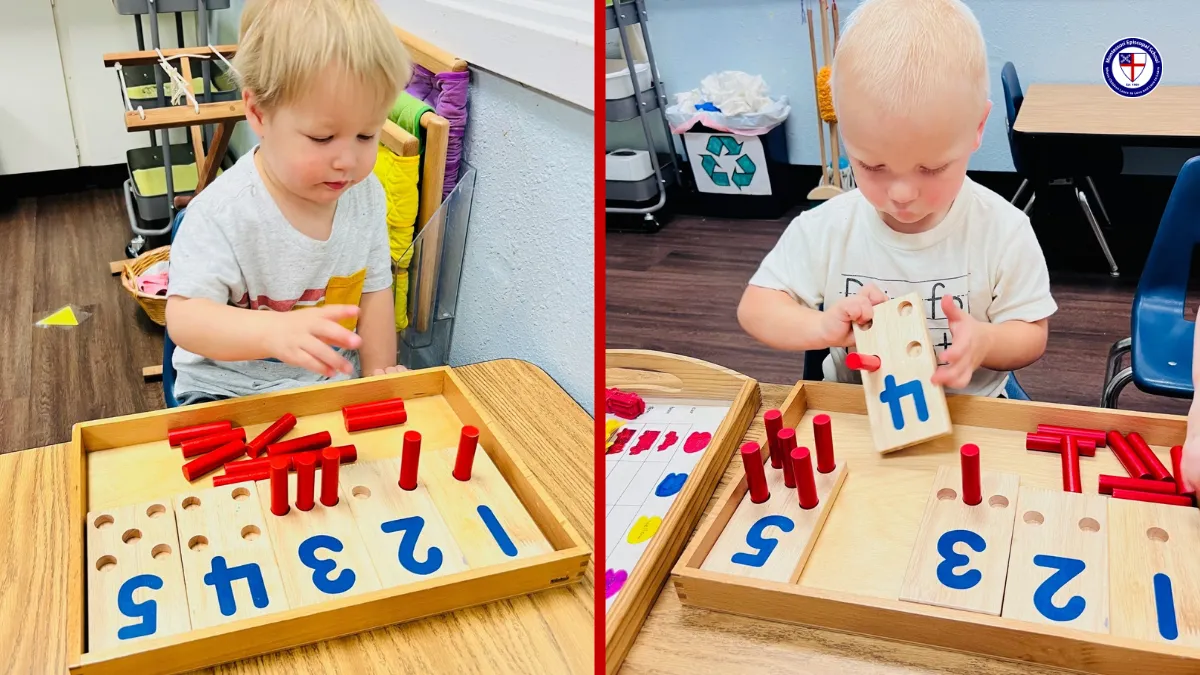
The Montessori math for toddlers’ approach is grounded in the belief that they are naturally curious and capable of learning complex concepts when provided with the right tools and environment.
Montessori math principles emphasize hands-on, sensory-based learning, where children explore mathematical ideas through concrete materials before moving to abstract concepts. This method helps young learners build a solid foundation in mathematics, fostering an intuitive understanding of numbers, shapes, and patterns.
Benefits of Early Math Education
Introducing toddlers to math early has numerous benefits that extend beyond academic achievement. Early math education in a Montessori setting:
- Enhances cognitive development by encouraging problem-solving and logical thinking.
- Builds confidence as children master new skills and concepts.
- Supports language development through the use of math-related vocabulary.
- Encourages a love for learning by making math enjoyable and accessible.
Research shows that early exposure to math concepts can positively impact a child’s future academic performance and ability to think critically and solve problems.
Hands-On Learning Activities
Montessori math for toddlers incorporates various hands-on activities to make learning engaging and effective. Some key activities include:
Number Rods:
- These rods help children understand the concept of quantity and the relationship between numbers. By physically manipulating the rods, toddlers can see and feel the difference between various quantities.
Sandpaper Numbers:
- These tactile cards introduce children to the symbols of numbers. By tracing the numbers with their fingers, children develop a sensory connection to numerical concepts, aiding in memorization and recognition.
Spindle Boxes:
- Spindle boxes help toddlers grasp the idea of counting and the concept of zero. Children place spindles into compartments labeled with numbers, reinforcing their understanding of quantity and numerical order.
Shape Sorting:
- Shape sorting activities introduce geometric concepts. Children learn to identify and differentiate shapes, enhancing their spatial awareness and cognitive development.
By engaging in these activities, toddlers learn mathematical concepts and develop fine motor skills, concentration, and independence. The Montessori method ensures that math is not just an abstract subject but a practical and enjoyable part of everyday life.
Montessori Mathematics Curriculum: Key Components
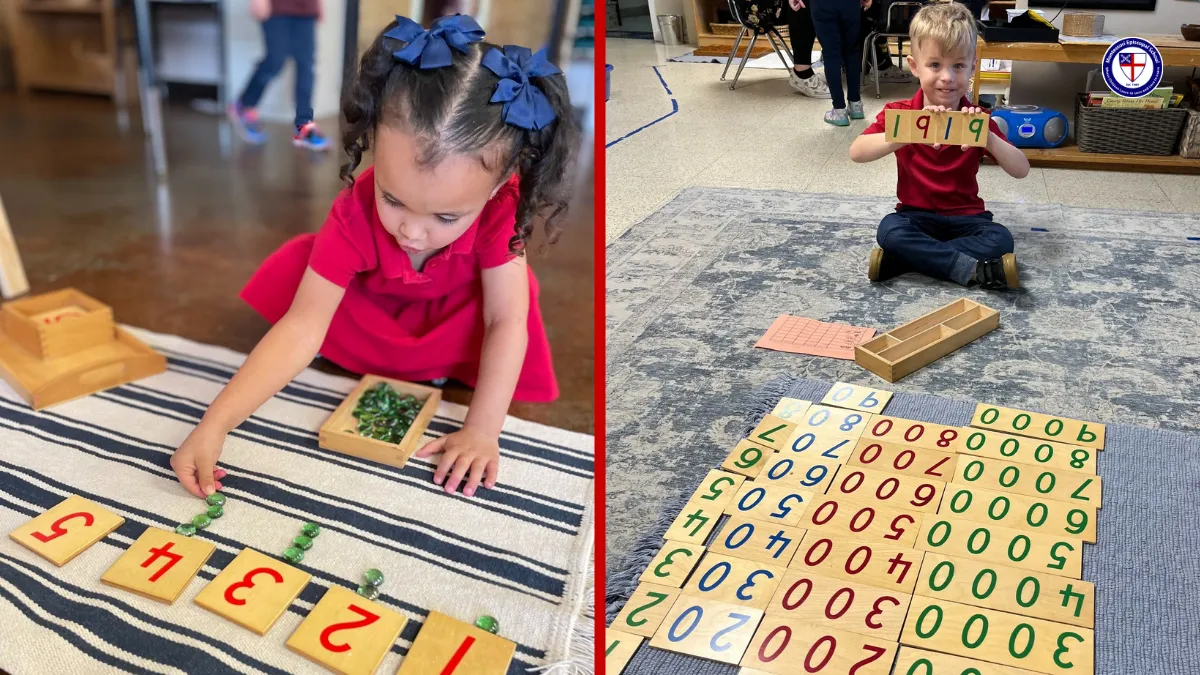
The Montessori mathematics curriculum is meticulously designed to build a deep and intuitive understanding of mathematical concepts in young learners. The curriculum is structured to progress from concrete to abstract, ensuring children grasp foundational ideas before moving on to more complex topics. Key components include:
- Number Sense: Children are introduced to numbers and their quantities through tangible materials like number rods and sandpaper numbers.
- Decimal System: Using golden beads, children learn about units, tens, hundreds, and thousands, which helps them understand the decimal system.
- Arithmetic Operations: Basic operations such as addition, subtraction, multiplication, and division are taught using hands-on tools like bead bars and counters.
- Geometry: Shape recognition and spatial awareness are developed through shape sorting and geometric solids.
- Fractions and Measurement: Practical activities involve measuring items and understanding parts of a whole, laying the groundwork for more advanced mathematical concepts.
Age-Appropriate Materials and Tools
Montessori classrooms have various age-appropriate materials that facilitate self-directed learning and exploration. These tools appeal to and engage, encouraging children to interact with them repeatedly. Some of the essential materials include:
- Golden Beads: Beads represent units, tens, hundreds, and thousands, aiding in the understanding of the decimal system.
- Bead Chains and Squares: Used to teach skip counting, multiplication, and the concept of squares and cubes.
- Fraction Insets: Tools that help children understand parts of a whole and the relationships between fractions.
These materials match the developmental stages of toddlers and preschoolers, ensuring that each child can learn according to their unique needs.
Role of Teachers in Guiding Mathematical Understanding
In a Montessori classroom, the role of the teacher is fundamentally different from traditional education settings. Teachers act as guides and facilitators rather than direct instructors. Their primary responsibilities include:
- Observing and Assessing: Teachers closely observe each child’s progress and interests, tailoring lessons to meet individual needs.
- Introducing Materials: Teachers demonstrate how to use the various mathematical tools and materials and then allow children to explore them independently.
- Providing Encouragement and Support: Teachers help children build confidence in their mathematical abilities by offering gentle guidance and encouragement.
- Creating a Prepared Environment: Teachers ensure the classroom is organized and rich with materials inviting exploration and discovery.
- Fostering a Love for Learning: Through their supportive and nurturing approach, teachers instill an enduring love for learning and an appreciation for the beauty of mathematics.
Combining a well-structured curriculum with thoughtfully designed materials and skilled guidance, Montessori Episcopal School ensures that children develop a strong mathematical foundation, setting them on a course to academic success and a love for learning.
Importance of Mathematics in Montessori
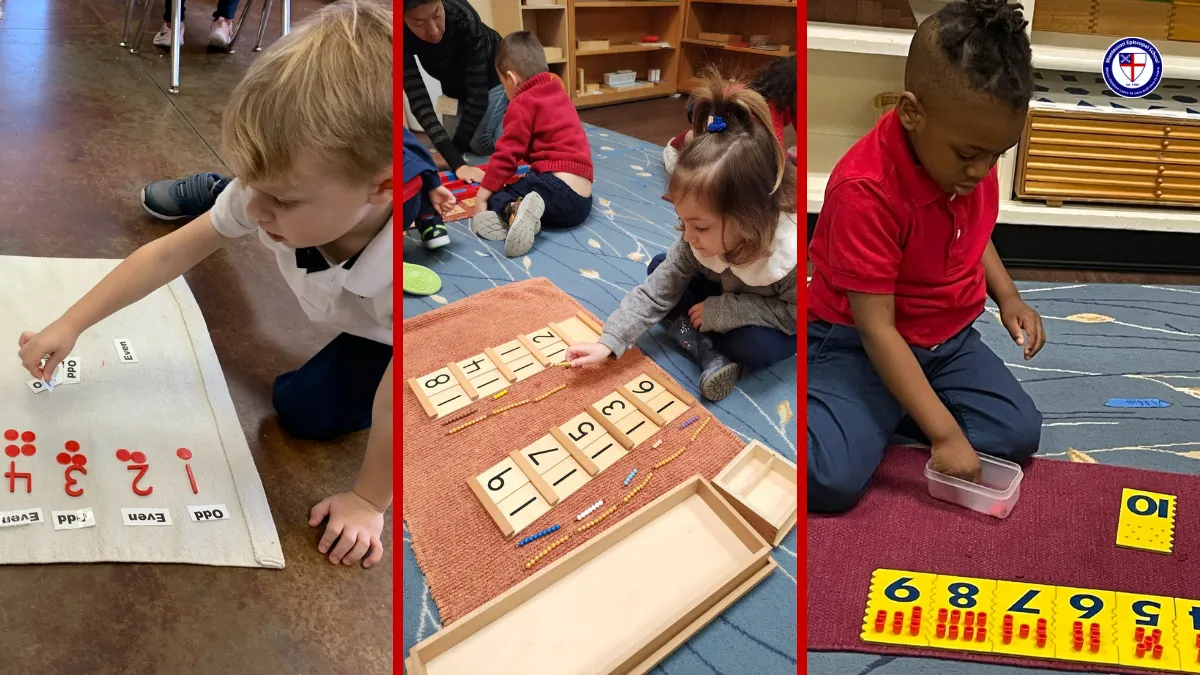
In Montessori education, mathematics is more than just numbers and equations; it’s a vital part of overall child development. Math skills foster critical thinking, problem-solving, and logical reasoning, essential for cognitive growth. These skills also support language development as children learn to articulate mathematical concepts and processes.
Fine motor skills are honed through counting beads and tracing numbers, while social skills are enhanced as children work together and share materials. The Montessori method ensures that math is a holistic intellectual and personal growth tool.
Integration of Math in Daily Activities
Mathematics is seamlessly integrated into daily activities in a Montessori classroom, making it a natural part of a child’s routine. Children encounter math concepts in various forms throughout the day:
- Practical Life Exercises: Activities like pouring, sorting, and measuring introduce children to basic math concepts such as volume, size, and quantity.
- Practical Life Exercises: Activities like pouring, sorting, and measuring introduce children to basic math concepts such as volume, size, and quantity.
- Snack Time: Counting pieces of fruit or measuring ingredients for a recipe incorporate math into everyday experiences.
- Outdoor Play: Nature walks and garden activities can involve counting leaves, sorting stones, or measuring plant growth.
- Storytime: Books with numerical themes or stories involving counting and patterns reinforce math skills.
By integrating math into daily activities, Montessori education ensures that children see the relevance and application of mathematical concepts in their everyday lives.
Long-Term Benefits of Strong Math Foundations
A strong foundation in mathematics during the early years has long-term benefits that extend well into adulthood. Children who develop robust math skills in a Montessori setting are more likely to:
- Excel Academically: Early mastery of math concepts sets the stage for future academic success in a variety of subjects.
- Enjoy Learning: Positive early experiences with math can foster a lifelong love of learning and intellectual curiosity.
- Think Critically: Math encourages logical reasoning and critical thinking, which are vital skills in all areas of life.
- Solve Problems Efficiently: The problem-solving skills gained through math activities help children approach challenges with confidence and creativity.
- Pursue STEM Careers: A strong mathematical foundation opens doors to careers in science, technology, engineering, and mathematics.
Montessori Episcopal School’s emphasis on the importance of mathematics ensures that children acquire essential math skills and develop a comprehensive understanding of how these skills support their overall growth and future success. By fostering an early love for math, we prepare our students to navigate the world’s complexities confidently and competently.
Conclusion
The Montessori method of mathematics at Montessori Episcopal School equips children with a robust foundation for lifelong success. By engaging in hands-on, sensory-based activities, young learners develop critical thinking, problem-solving, and a love for math that extends beyond the classroom. This approach enhances cognitive development and fosters independence, creativity, and confidence. As children progress through the carefully designed curriculum, they acquire essential skills that support their overall growth and prepare them for future academic achievements.
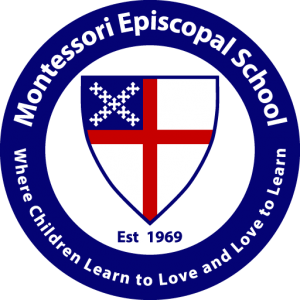
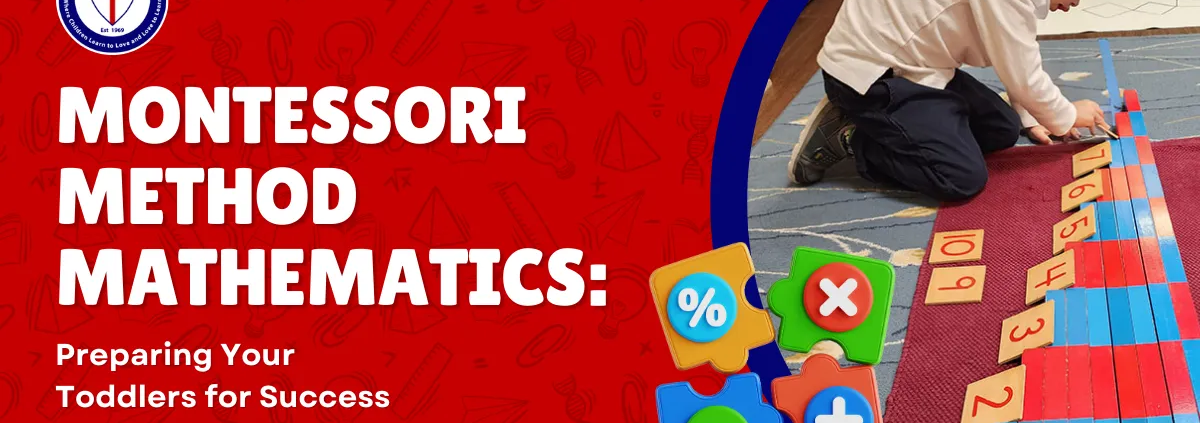


Leave a Reply
Want to join the discussion?Feel free to contribute!